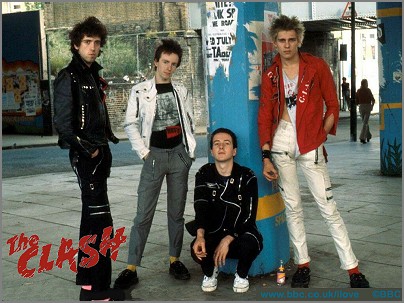
I Fought The Law...
There are many misconceptions surrounding The Clash. Regarding them as nothing more than punk rockers frequently tops the list. This happens because they started as that, and because one of their most successful songs from later on is a very loud number (you know which one – the one posing the existential dilemma).
Out of the six albums they were to release, only the first two ones deserve a “punk” label. They are the self-titled record (1977) and the one named “Give ‘Em Enough Rope” (1978). The third one (“London Calling”, 1979) had them diversifying their sound notably, until they experimented as much (or even more) than the Beatles in their triple album “Sandinista!” (released in 1980). The final album by the classic lineup was “Combat Rock” (1982), and it yielded two major American hits: the banal “Should I Stay Or Should I Go” and the so-so “Rock The Casbah”. These are the two songs most people associate with the band, and it is a bit shameful because they were capable of so much more than misconceptions arise and it is difficult to set things to right sometimes, even when you are talking to people who are music-educated.
The creative section of the band comprised Joe Strummer and Mick Jones. They both sang lead vocals, and while Strummer provided rhythm guitar Jones mostly took care of the lead. The bassist was Paul Simonon, and the drummer was either Terry Crimes or Topper Headon (they replaced each other several times). And from a certain point onwards all band members began singing, with varying results.
Their first single, “White Riot”:
Strummer (1952 – 2002) was the son of diplomats (he was actually born in Angola, as he sang in “Junco Pardner”), and he was the oldest member of the band. Owing to that he had a somehow more developed grasp on world politics and the standing of the British Empire, and the band was to become renowned for the political charge (and discharge) that permeated their songs relentlessly. A quick listen to “Spanish Bombs”, “Washington Bullets” and the monumental “Something About England” exemplifies that.
As I said above, experimentation played a big part in the history of The Clash. This is particularly evident in the albums “London Calling” and “Sandinista!”. Traditionally speaking, the former is praised (Rolling Stone voted it the best album of the 80’s) whereas the latter comes under scrutiny. I am making a case they are equally enjoyable, and that the best songs in “Sandinista!” do match (and even surpass) the best songs making up “London Calling”.
Note that there was also an album named “Cut The Crap” whcih was released in 1985, after Mick Jones had left the group. Only Strummer and Simonon were around by that point, and they quickly disowned it.
Personally speaking, I consider The Clash a very significant band. The Pistols/Clash comparison is a recurrent one, but it is not really spot-on or even fair for that matter. The Sex Pistols released just one album, and The Clash released six. We do not have enough elements to draw a comparison. The Pistols are the best punk band I ever listened to. The Clash are something else. That is, they had the chance to show us they could be something else. And they make listeners realize that in life as in art labels and tags sometimes are pointless. The soul is what matters, and that is something a mere label will never capture. All I can tell you is that they made music that often defied (and still defies) translation, and that listening to them is a truly broadening experience. They were once marketed as “The Only Band That Matters”. If we change that to something along the lines of “The Only Band That Matters When You Have To Learn What Matters” we have the one and only apt definition of The Clash I could come with, and the one which does them justice – as people, as a band, and as motivators of inner and external action.

Pingback: Band Central – Resources For Musicians | MusicKO
Pingback: My Favorite Elvis Costello Lyrics (Part 1) | MusicKO
Pingback: Linda Ronstadt – General Introduction | MusicKO
Pingback: Month In Review – August 2009 | MusicKO
Pingback: Year In Review – 2009 | MusicKO
Pingback: English Settlement (XTC) – Album Review (Part 1) | MusicKO